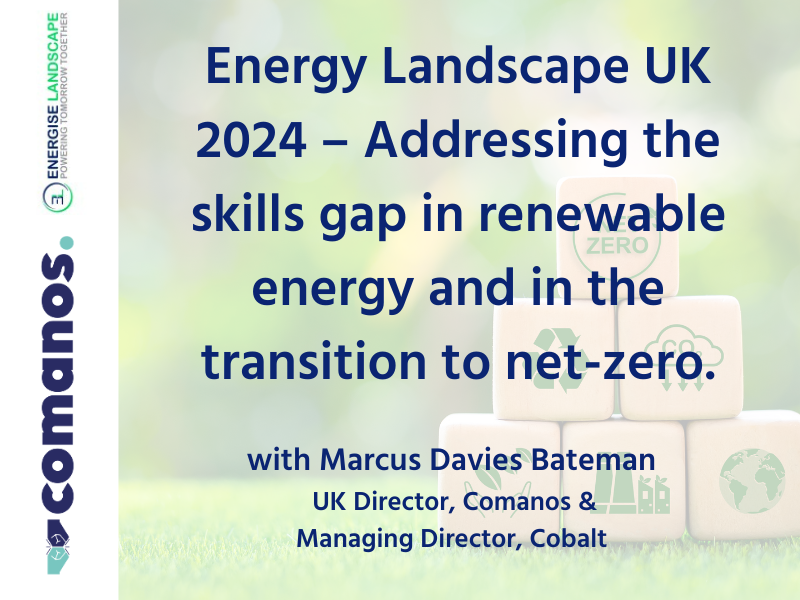
Article posted by on Oct 17, 2024
The recent Energy Landscape UK 2024 conference convened 48 industry leaders, government officials, and stakeholders to explore the UK's path to a net-zero future. As the first major energy conference following the 2024 election, this event provided a timely and critical platform to discuss the opportunities, challenges, and strategic actions needed to achieve a sustainable and de-carbonised energy landscape. Here, we sum up some of the key takeaways from the conference.
Clarity around net zero and the renewables roadmap
One of the biggest themes to come out of the conference was the lack of clarity felt by all potential stakeholders in the transition to net zero, with policymakers, employers, and the wider public not fully understanding what ‘net zero’ means for them. We’ve certainly seen this at Cobalt through our ESG recruitment division, with employers in the real estate space not necessarily understanding the responsibilities they have in either the remodelling of existing builds and policies, or in the development of new ones.
External, geopolitical events like the Ukraine-Russia conflict have understandably impacted the timeline of when and how net zero can be achieved, but arguably as this has had such a profound influence on energy prices, it provides an even bigger opportunity to facilitate the changes required. To do this, expert-led talks at the conference highlighted the importance of three main areas:
Consistent cross-party energy policies (building on from Labour establishing Great British Energy, for example) being incredibly important to ensure confidence from businesses and continuity for investors. In evaluating government policies, including the British Energy Security Strategy and renewable energy initiatives, the event highlighted areas for improvement, particularly in sectors like onshore wind and tidal power, with offshore wind and the enhancement of smart grids a priority to support energy independence.
Ongoing investment in both emerging and established energy technologies (with hydrogen projects and renewable energy a focus here).
Sustained public-private collaboration, like Nissan’s future in Sunderland, being established.
What was apparent across all these areas, from each of the talks across the Conference, was that continued investment in skill development and collaboration would be required to ensure a successful transition. Achieving the 2030 clean energy target will not only require robust regulatory reforms and strategic investments but a concerted effort to educate and engage the public, too. Building a skilled workforce and fostering industry-government collaboration will be crucial steps toward realising a sustainable and resilient energy system for the UK.
The skills gap inhibiting the move to renewable energy
Specialist panels at the event, consisting of the C-suite from energy companies, renewables innovators, and Government officials, highlighted the shortage of skilled workers as a major barrier to deploying established technologies like solar panels and energy storage solutions, and emerging technologies like renewable energy, hydrogen, nuclear, and CCS. There was a strong consensus on the need to invest in re-training the existing workforce and attracting new talent to meet the demands of a rapidly evolving energy landscape.
The importance of education, both in schools and within the broader community, was stressed as vital for equipping the future workforce with the necessary skills. There were calls for more apprenticeships, vocational training programs, and industry-led initiatives that provide practical experience and training aligned with the needs of the energy sector. Participants in panels at the Conference emphasized the importance of integrating energy transition topics into the educational system, starting from schools through to higher education. By fostering an early interest in STEM (Science, Technology, Engineering, and Mathematics) subjects, the UK can build a pipeline of future talent equipped to lead in the energy sector - educational reforms that prepare the workforce for the demands of a decarbonised economy.
These reforms would help generate the next generation, but for the here and now, public sector and private sector collaboration on training will be vitally important to ensure the development of the space.
How Comanos can assist with Real Estate Renewables Recruitment
Comanos, part of The Cobalt Group, is uniquely positioned to assist your company in navigating this evolving landscape. Leveraging Cobalt’s 23 years of experience in real estate, Comanos can help through our:
Expert Recruitment Services: We specialise in connecting top talent with leading companies in renewable energy and real estate, ensuring you have the expertise needed to drive your projects forward.
Industry Insights and Guidance: Our deep industry knowledge and insights from forums like UKREiiF provide you with the latest trends and opportunities, helping you make informed strategic decisions.
Tailored Support: We offer personalised guidance and support, from the identification of roles through to job descriptions, sourcing, and interviewing of candidates, to ensure that you get the best talent for your organisation to help you achieve your goals.
Get in touch with me below, I’d be delighted to see how Comanos could assist.
Email: MDB@comanos.co.uk
Phone: +44 (0)7488821918